Third World Foundation for social and economic studies (known as Third World Foundation) was registered as a Charity in 1978 under the laws of England and Wales, dedicated to work for the intellectual, economic and social advancement of the people of the Third World through recognition of contributions of people and institutions, publications, research and open international debate.
In the early sixties, the demand for the establishment of a New International Economic Order began to be voiced in different national and international forums. The United Nations and the Non-Aligned Movement recognised the growing economic disparities between the industrialised countries of the North and the developing countries of the South and stressed the need for restructuring the prevailing economic system on a fundamentally just and equitable basis.
By the end of the decade a global equality ethos gripped the people in Latin America, in the Caribbean, in Africa and in Asia. They realised that political freedom had not brought economic emancipation in its wake. Linked by common history and united in a common vision of the future, they expressed their determination to end the domination of an iniquitous economic order. They demanded orderly but speedy change and a decisive role in determining its direction.
Since the 1960s the developing countries in the Third World were chasing the goal of South-South cooperation and self-reliance.
The Group of 77 (G-77) established in 1964 was a coalition of developing countries (excluding China) designed to speak for developing countries, however, the negotiating capacity of the G-77 was restricted to the United Nations. G-77 solidarity was often strained, and mutual trust eroded, and it gradually drifted into irrelevance.
The United Nations Conference on Trade and Development (UNCTAD), also established in 1964, was a permanent intergovernmental body and is the part of United Nations Secretariat whose goals are simply to: "maximize the trade, investment and development opportunities of developing countries and assist them in their efforts to integrate into the world economy on an equitable basis".
The G-77 and the UNCTAD were not the initiatives by Third World countries themselves. Examples of such important initiatives would be the Organisation of African Union (1963) to co-ordinate and intensify the co-operation of African states, and ASEAN (1967) to accelerate economic growth, social progress, and cultural development and to promote peace and security in Southeast Asia. Both the OAU and ASEAN initiatives were for regional cooperation and not a collective group to represent all developing countries.
South-South Dialogue
In 1977, a group of Third World scholars urged that an institution should be established where the North-South dialogue is followed closely and where Third World problems and prospects are studied and published.
On 14-16 December 1978, a small group of Third World thinkers, policy makers and negotiators met informally at Arusha, Tanzania for an informal and unofficial review of the North-South dialogue on the creation of a New International Economic Order (NIEO) adopted at the Sixth Special Session of the United Nations General Assembly in 1974. The idea of the NIEO stalled and one of the most frequent explanations given was the lack of political will, especially among the developing countries. Another reason was the frequently cited example in the NIEO agenda requiring the increased participation of the developing countries in the IMF and World Bank decision-making.
The meeting was sponsored by the Third World Foundation even before it was formally established a year later in 1979. Participation was purely in a personal capacity. The real objective was to view the North-South dialogue in the framework of economic decolonisation on the Third World and liberation from the past patterns of economic, cultural and political dependency, as well as to reform the international and monetary financial institutions. It was agreed by the participants that there was need for urgently study the proposals, prepare analyses and coordinate programmes of Third World cooperation.
President Julius Nyerere of Tanzania was present in two sessions on the first day of the South-South dialogues and his inspiring contribution helped to formulate the Third World Foundation's own programme as an independent non-governmental organisation. It was also in Arusha that the seeds of the Third World Bank were sown.
The Third World Foundation was established in London as a charitable organisation with funding provided by Bank of Credit and Commerce International (BCCI).
Launch of the Third World Foundation
Mr Agha Hasan Abedi, BCCI’s founder and President launched the Third World Foundation in London on 29 October, 1979. The launch of the Third World Foundation was attended by Jamaican Prime Minister Michael Manley, Lord Callaghan and the then-general secretary of the Commonwealth, Sir S.S. Ramphal.
At the inaugural function the Third World Annual Lecture series, the Third World Prize was announced by the Hon Michael Manley, Prime Minister of Jamaica. He said: "Today the Foundation launches a new lecture series and the idea of a Third World Prize. Neither lecture nor prizes are unusual. But I dare to believe that this occasion is important not only for what it inaugurates, but also for the change in perception of the world that it reflects".
Mr Manley delivered the inaugural lecture on the Third World under Challenge: The Politics of Affirmation.
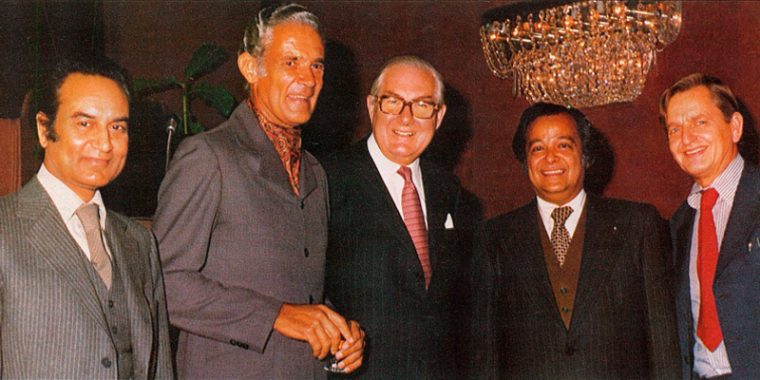
Arguably, Mr Abedi at the time was the only corporate head who visualised the challenges posed by the changing profile of the world in the 21st century and secured the support of individuals like the former US President Jimmy Carter in creating awareness about these challenges, and for this purpose BCCI created a think tank called "Vision-2000" chaired by Jimmy Carter.
Trust Deed of the Foundation
The Trust Deed was made between the Bank of Credit and Commerce International SA (BCCI) of 39 Boulevard Royal, Luxembourg (Settlor) and the Trustees who exercised their powers in accordance with the provisions of the Trust Deed.
The Trust Deed provided that the Foundation would not accept, directly or otherwise, any aid or assistance from any government or official agency. Mr Abedi, BCC President was Chairman of the Board of Trustees.
Objectives and Structure
The key objectives of the Foundation were to work for the intellectual, economic and social development of the people of the Third World through publications and research; to assist in the evolution of a fundamentally just and equitable relationship between the Third World and the developed countries; to create greater awareness of the causes of poverty in the Third World.
The entry on Third World Foundation for Social and Economic Studies (TWF) in the Open Yearbook published by the UNION OF INTERNATIONAL ASSOCIATIONS (Union des Associations Internationales), Brussels, Belgium reads:
History: 1978, London (UK). Also referred to as Third World Foundation. UK Registered Charity: 275515.
Aims: Relieve poverty and sickness and advance education among inhabitants of Third World countries through the establishment of programmes of research and investigation, the results of which will be disseminated to the general public and to organizations; directly concerned with improving the conditions of life in the Third World.
An institutional structure of the Foundation continued to evolve with the association of committed persons from different regions of the world who had identified themselves with the objectives of the Foundation. They determined a permanent policy framework of the Foundation and its administrative and advisory structure.
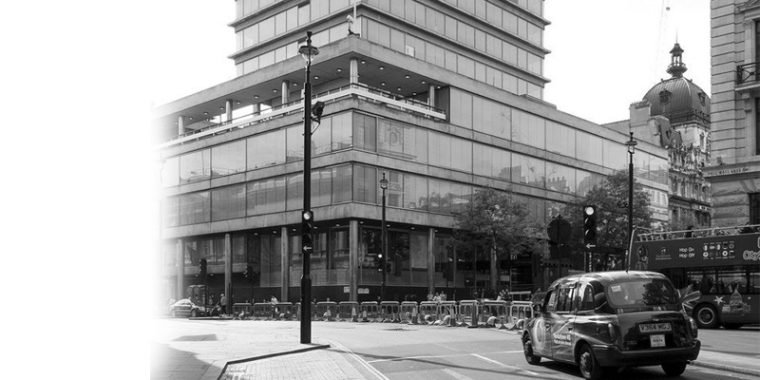
The headquarters of the Third World Foundation was situated at:
New Zealand House, 80 Haymarket, London SW1 4TS, Telephone: 01 930 8411, Telex: 8814201 Trimmed G, Cables: Foundation

Mr Altaf Gauhar was Secretary-General and Chief Executive of the Foundation, and the position of Principal Adviser was held by Azim Husain. Both positions were honorary.
Altaf Gauhar, prior to his involvement with Foundation, was chairman of Third World Media in London and one of the first co-editors of the Third World Review published by the Guardian newspaper and subsequently, he also set about launching several other initiatives to highlight, mainly through an academic journal, Third World Quarterly, and a monthly magazine called South, the problems and challenges confronting developing countries.
Azim Husain was an Indian diplomat who served as Deputy High Commissioner to the United Kingdom in the late 1950s and early 1960s and Ambassador to Egypt and Lebanon in the 1960s. From 1970 to 1978, he was Deputy Secretary General of the Commonwealth, managing the transition from Mr Arnold Smith to Sir Shridath Ramphal as Secretaries General in this period.
Policy of the Foundation
The policy of the Foundation was determined in accordance with the Trust Deed and in consultation with members, international advisers and associates of the Foundation. The Foundation promoted joint projects in collaboration with other universities and institutions and co-sponsored a series of seminars for the intellectual, economic and social advancement of the people of the Third World.
BCC and the Third World
BCC's knowledge expertise in handling international transactions involving export and exports meant that the strength of BCC's banking operations and local presence had a greater value in the developing countries that included China and referred to as the Third World. The presence of large foreign commercial banks of the Western colonial powers were exploiting the local markets with foreign nationals holding managerial and senior positions in the banks. The arrival of BCC managed principally by bankers from the Third World made the population and businesses in the developing countries aware that there was a realistic option to colonial the imperialism where foreign banks dominated their economies and supressed their thoughts and prevented them managing their own banks.
The establishment of the Third World Foundation as a charity in London in 1979 funded by BCC reflected the genuine desire of Mr Agha Hasan Abedi, BCC President, to advance the intellectual, economic, and social development of the people of the Third World. He promoted South-South financial cooperation by expanding BCC branches and financial institutions to reduce total dependence of the Third World on foreign banks and foreign nationals for domestic banking requirements.
In July 1983 at a conference in Yugoslavia, Mr Abedi submitted a proposal to set up a Third World Bank to ease the debt burden of developing countries and extend to them self-liquidating loans in foreign exchange to finance their export and import business while charging commercial interest rates.
South-South Cooperation
At the South-South Conference in July 1983 held in Beijing, China, Agha Hasan Abedi, President of BCC and Chairman Board of Trustees of the Third World Foundation, presented the proposal to establish a Third Word Bank for the purpose of bridging finance and extend short term commodity credit to Third World Countries. He mentioned that there was also scope for the Third World Foundation to make a modest contribution in three directions, to carry out an objective and independent analysis of the economic and social problems confronting the Third Word, to establish appropriate channels of communications between the developing and developed countries and to arrange period meetings of scholars and statesmen to examine and evaluate results of strategies and programmes of development and cooperation.
At the South-South Cooperation Banquet held on 12 November, 1985 in Harare, Zimbabwe, Mr Agha Hasan Abedi in his address as Chairman, Board of Trustees of the Third World Foundation said about BCC, "We in the Bank see our work not exclusively in terms of profits and material gain - they are important because without those we would not be here - but we see the pursuit of gain in the context of human happiness. That is why we have gone to areas which have been neglected by other businesses and finance houses. We are dedicated to the welfare of the people, we believe in their happiness and peace, and stability and we feel that these objectives can be achieved through the constant exchange of ideas through better communication and through mutual understanding. We seek to create no lobby unless it is the lobby of the poorer, the under-privileged and the deprived".
Global 2000
Mr Abedi also involved BCC in providing financial and ground support for the work of the Global 2000 initiative of The Carter Center in Atlanta, USA. Global 2000 was founded by former US President Jimmy Carter and his wife, trying to combine agriculture, health care, and environmental quality work around the world, with projects in China, Bangladesh, Pakistan, Tanzania, Uganda, Kenya, Ghana, Nigeria, Zambia, and other countries. For example, Global 2000 worked on the eradication of dracunculiasis (Guinea worm disease) in Africa and Asia since 1986.
The Centre for Comprehensive Security and Common Survival
At a symposium on "Survival in the Nuclear Age", held at the United Nations in April 1984, Mr Abedi as Chairman of the Board of Trustees of the Third World Foundation, submitted a proposal for a Centre for Comprehensive Security and Common Survival, that would be global in scope and universal in purpose. He believed strongly that we must also consider the psychological dynamics of the arms race, which now threatens the extinction of our civilization and the virtual extermination of our species. The new paradigm that he was advancing is that of a strengthened consciousness on the part of millions of people of the threat posed to survival by the burden of weaponry under which the world is groaning.
Work of the Foundation
The Foundation had taken on many worthwhile projects in collaboration with international academic and research institutes. Prominent among these were the North-South Monitor (in conjunction with the Institute of Commonwealth Studies, University of London) to analyse the state of North-South negotiations; and the Regional Collective Self-Reliance (in conjunction with the Marga Institute, Sri Lanka Centre for Development Studies) which was surveying economic cooperation for development in South Asia. In addition to this work, the Foundation had established an undergraduate scholarship and a postgraduate research grant at the London School of Economics. From this firm base of achievements, the Foundation launched its next - and possibly most worthwhile - venture. At the inaugural function which initiated the Third World Annual Lecture series in London last October 1989, the Hon Michael Manley, Prime Minister of Jamaica, announced the institution of an annual Third World Prize to 400 distinguished guests, which included statesmen, industrialists, diplomats and bankers.
The work of the foundation was guided by an Advisory Committee, in 1983 it was constituted of:
- Dr Ali Attiga, Secretary-General, Organization of Arab Petroleum Exporting Countries (OPAEC)
- HE Mr Bernard C Chidzero, Minister of Finance Economic Planning and Development, Zimbabwe
- HE Lt Col Antoine Kipsa Dakoure, Upper Voltarian Ambassador, Brussels
- Mr E. V. Iglesias, Executive Secretary, Economic Commission for Latin America
- HE Mr Amir Jamal, Minister of Finance, Tanzania
- Dr Raul Prebisch, former Secretary General, UNCTAD
- HE Mr S. S. Ramphal, Secretary General, Commonwealth Secretariat
- Dr Abdus Salam, winner of 1970 Noble Prize in Physics for research on physics of elementary particles and Director, International Centre for Theoretical Physics, Trieste, Italy; he was Founder and President Third World Academy of Sciences (1983), a global science academy based in Trieste.
- Professor A. K. Sen, All Soul’s College Oxford, Indian economist and philosopher, later awarded the Nobel Memorial Prize in Economic Sciences in 1998
- Dr K Soedjatmoko, United Nations University, scholar of international development and politics, and appointed Rector University in September 1980.
In 1988 the following persons served on the Advisory Committee:
- Dr Ali Attiga, Secretary-General, OAPEC
- HE Mr Bernard G Chidzero, Minister of Finance, Economic Planning and Development, Zimbabwe
- HE Mr K K S Dadzie, Secretary-General, UNCTAD
- Mr E V Iglesias, Minister of Foreign Affairs, Uruguay
- HE Mr Amir Jamal, Permanent Representative of Tanzania, Geneva
- HE Mr SS Ramphal, Secretary-General, Commonwealth Secretariat
- Professor Abdus Salam, Director, International Centre for Theoretical Physics
- Professor A K Sen, All Souls College, Oxford; Dr K Soedjatmoko, Rector, UN University.
UN Consultative Status
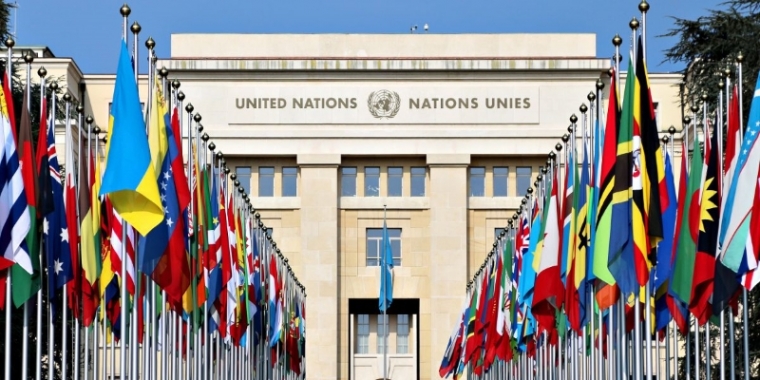
In 1981 the Third World Foundation was accorded Consultative Status by the Economic and Social Council under Economic and Social Council Resolution 1296 (XLIV). The Economic and Social Council (ECOSOC) is one of the six principal organs of the United Nations (UN) and responsible for the direction and coordination of the economic, social, humanitarian, and cultural activities carried out by the UN.
In its consideration the Council took note of the fact that the Third World Foundation as a non-government organisation 'aims to relieve poverty and sickness and to advance education among the inhabitants of the Third World countries. It also works for the intellectual, social and economic development of the peoples of the Third World, assists in the evolution of a fundamentally just and equitable relationship between the developed countries and the Third World, and aims to create a greater awareness of the problems of hunger, poverty and ignorance in the Third World'.
The Foundation had designated official representatives to the United Nations in New York and Geneva in order to play an active role in the consultative arrangement process.
Publications of the Third World Foundation
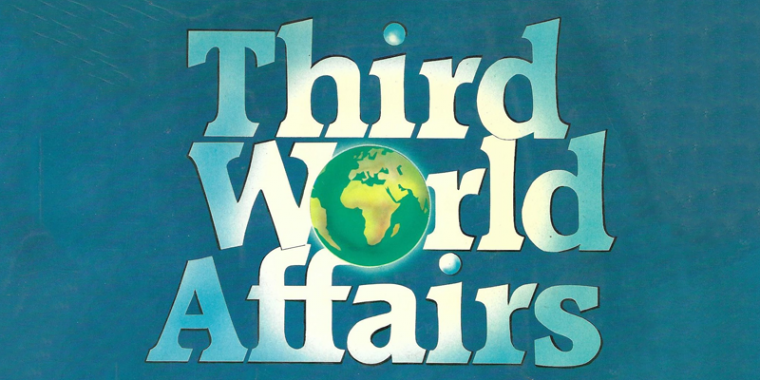
 South: A monthly magazine launched in 1980 that became the voice of the vital Third World marketplace, viewing the world through Third World eyes and packed with information and uncompromising comment - about trade, politics, economics and culture.
South: A monthly magazine launched in 1980 that became the voice of the vital Third World marketplace, viewing the world through Third World eyes and packed with information and uncompromising comment - about trade, politics, economics and culture.
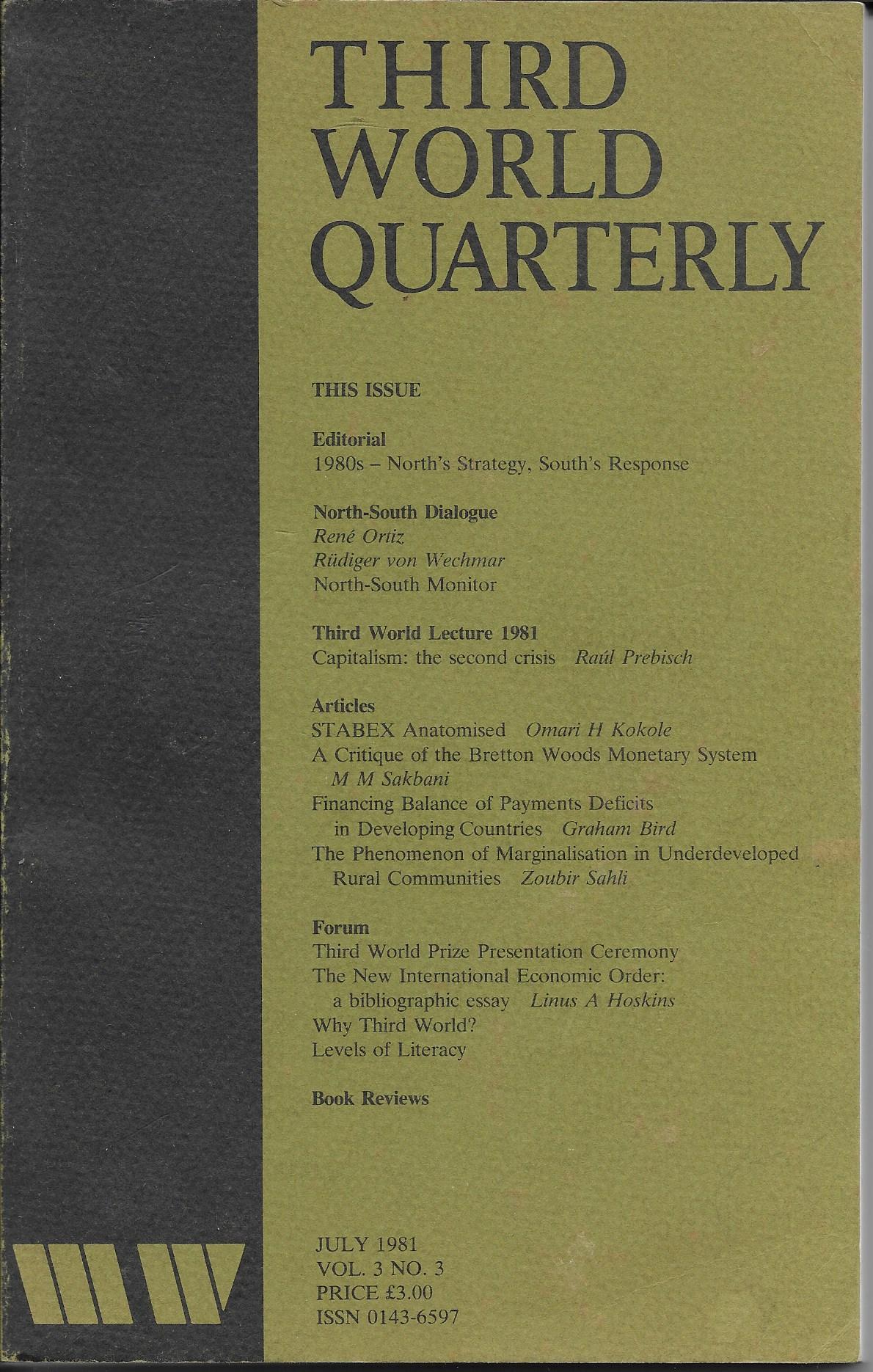 Third World Quarterly: A unique journal of Third World opinion on major contemporary issues, launched in 1979 having an international readership that included development economists, political and diplomatic decision makers, government policy makers and non-governmental opinion formers. Scholars from North-South contributed on the course of North-South dialogue, the possibilities of the South organising itself to bring about change in the international system, economic and financial issues, regional and national problems and conflicts, major international conferences and reports, as well as in-depth interviews with statesmen and policy makers involved with these issues.
Third World Quarterly: A unique journal of Third World opinion on major contemporary issues, launched in 1979 having an international readership that included development economists, political and diplomatic decision makers, government policy makers and non-governmental opinion formers. Scholars from North-South contributed on the course of North-South dialogue, the possibilities of the South organising itself to bring about change in the international system, economic and financial issues, regional and national problems and conflicts, major international conferences and reports, as well as in-depth interviews with statesmen and policy makers involved with these issues.
 Special Issues Third World Quarterly: Special issues covering a single subject - After Apartheid (1987), The Politics of Exile (1987). Succession in the South (1988) and Islam and Politics (1988).
Special Issues Third World Quarterly: Special issues covering a single subject - After Apartheid (1987), The Politics of Exile (1987). Succession in the South (1988) and Islam and Politics (1988).
.jpg) Third World Affairs: An annual publication introduced from 1985 to bring into a sharper focus the more fundamental and persistent problems faced by the Third World, and the measures adopted for their resolution. This annual feature builds on the Third World Quarterly started in January 1979 which developed an inter-disciplinary approach allowing full expression to different schools of thought engaged in a search for a more equitable international order.
Third World Affairs: An annual publication introduced from 1985 to bring into a sharper focus the more fundamental and persistent problems faced by the Third World, and the measures adopted for their resolution. This annual feature builds on the Third World Quarterly started in January 1979 which developed an inter-disciplinary approach allowing full expression to different schools of thought engaged in a search for a more equitable international order.
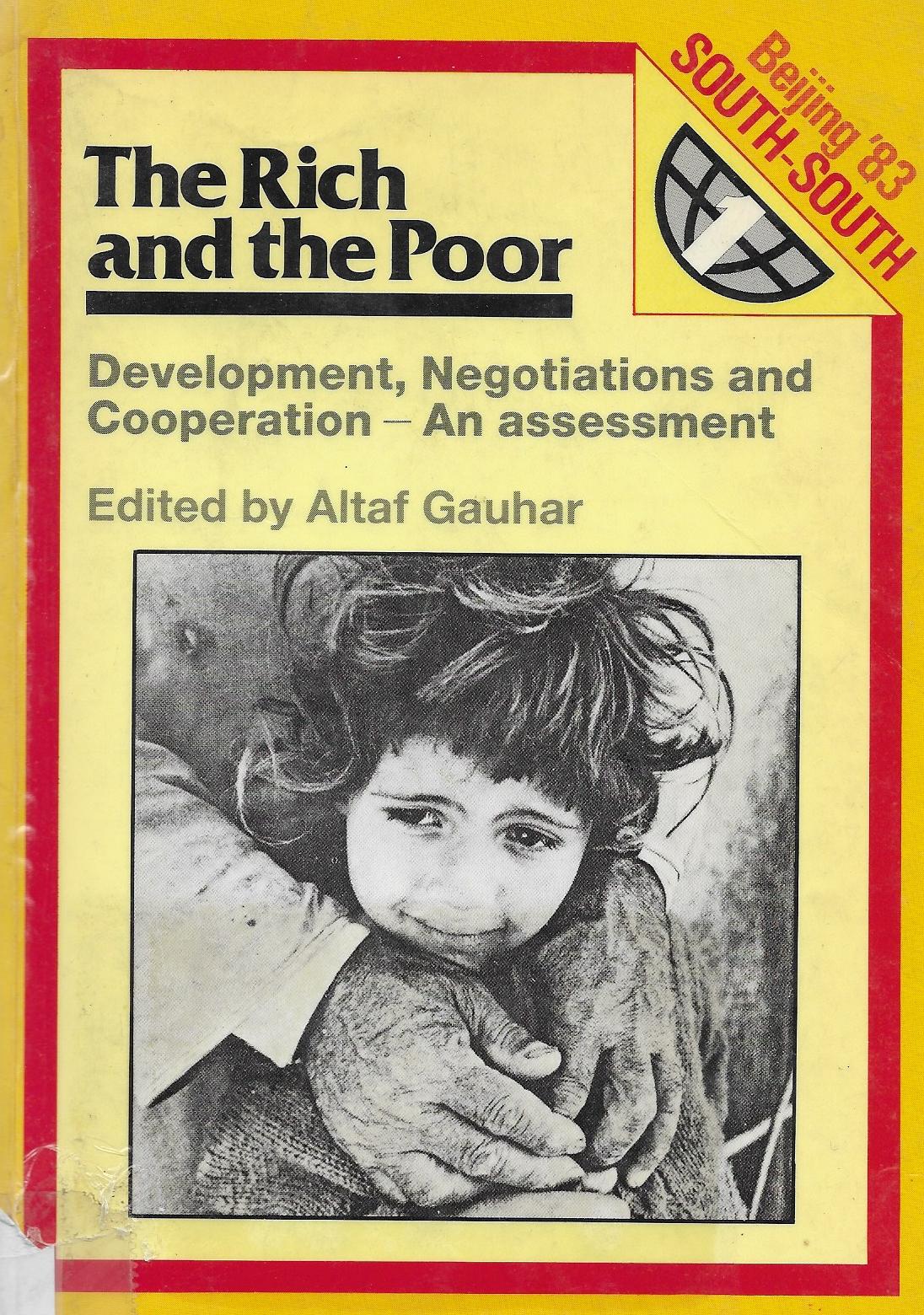 Rich and the Poor: Development, Negotiations and Cooperation - An Assessment, 1983: The essays attempt to identify the obstacles to North-South cooperation and to critically review the Third World's own record of development, negotiation, and cooperation.
Rich and the Poor: Development, Negotiations and Cooperation - An Assessment, 1983: The essays attempt to identify the obstacles to North-South cooperation and to critically review the Third World's own record of development, negotiation, and cooperation.
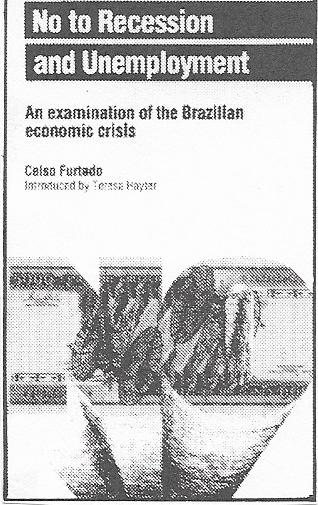 No to Recession and Unemployment: The author debunks many of the misconceptions concerning the nature of sovereign debt, elaborates an economic programme of reform without recession and unemployment; and demonstrates that recovery and growth for debt-burdened Third World countries is not possible without a clear break from the guardianship of the IMF and the recovery of control over national economic policy.
No to Recession and Unemployment: The author debunks many of the misconceptions concerning the nature of sovereign debt, elaborates an economic programme of reform without recession and unemployment; and demonstrates that recovery and growth for debt-burdened Third World countries is not possible without a clear break from the guardianship of the IMF and the recovery of control over national economic policy.
.jpg) South-South Strategy, 1983: Offers a collection of articles published in the Third World Quarterly (1978-1981). which deal with some of the more important and enduring aspects of North-South relations; they point emphatically to one conclusion: that the South must organise itself into a cohesive political and economic force if it wishes to secure a fair deal from the North.
South-South Strategy, 1983: Offers a collection of articles published in the Third World Quarterly (1978-1981). which deal with some of the more important and enduring aspects of North-South relations; they point emphatically to one conclusion: that the South must organise itself into a cohesive political and economic force if it wishes to secure a fair deal from the North.
.jpg) Talking About Development, 1983: Sixteen internationally renowned politicians and others look critically at the Third World and the North's responsibility towards the South. dealing with such topics as disarmament, the spending of petroleum revenues, aid, development strategies, protectionism, and the cause of inequality within and between the countries.
Talking About Development, 1983: Sixteen internationally renowned politicians and others look critically at the Third World and the North's responsibility towards the South. dealing with such topics as disarmament, the spending of petroleum revenues, aid, development strategies, protectionism, and the cause of inequality within and between the countries.
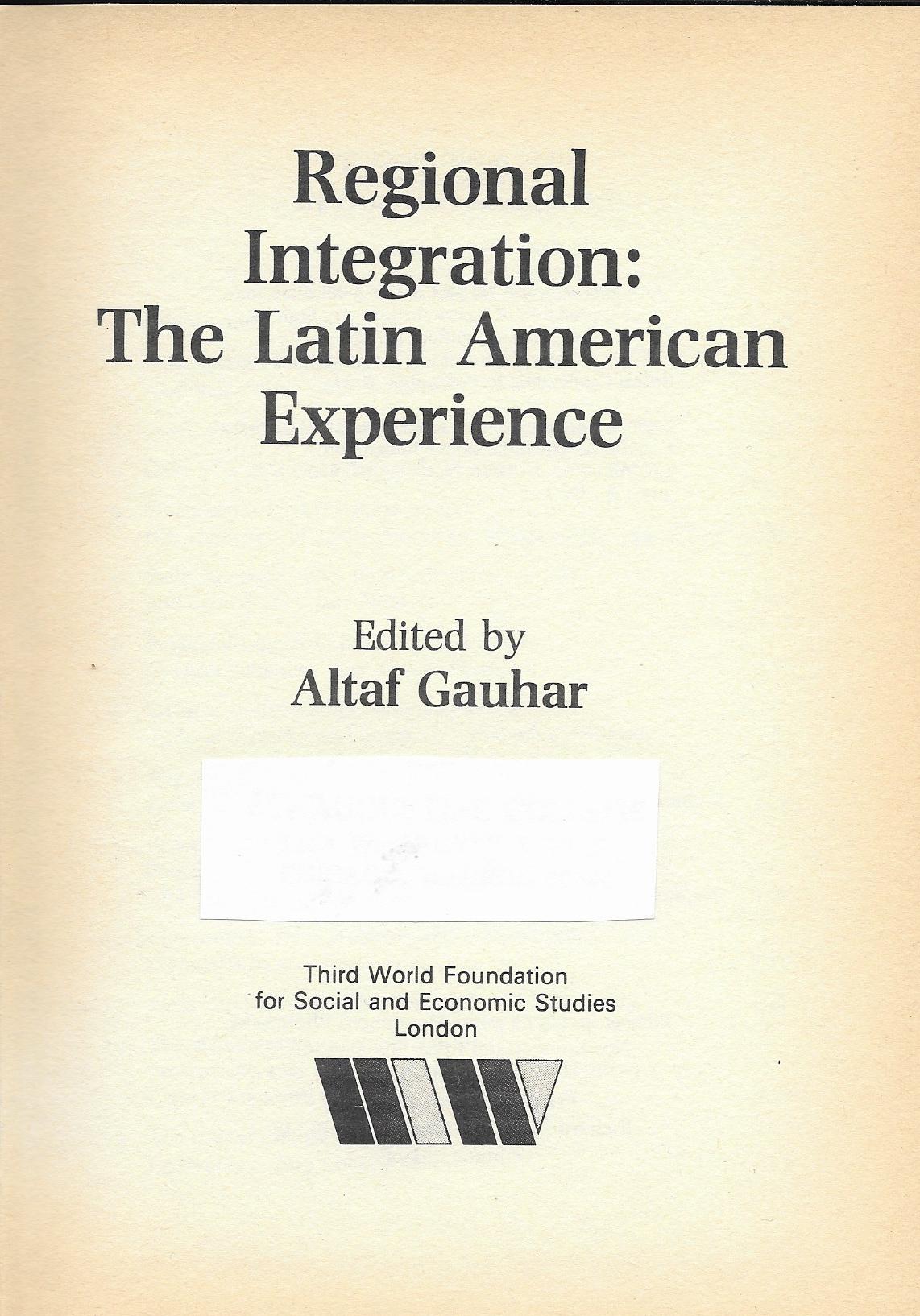 Regional Integration - The Latin American Experience, 1985: A collection of 13 papers presented by the conference scholars and officials at the first regional conference held in 1984 in Cartagena, Colombia under the Beijing programme and marked an important step towards South-South Two Summit scheduled for 1986. The book outlines and discusses new formulae to make integration workable within the constraints of the present economic conditions and pressures facing Latin American countries.
Regional Integration - The Latin American Experience, 1985: A collection of 13 papers presented by the conference scholars and officials at the first regional conference held in 1984 in Cartagena, Colombia under the Beijing programme and marked an important step towards South-South Two Summit scheduled for 1986. The book outlines and discusses new formulae to make integration workable within the constraints of the present economic conditions and pressures facing Latin American countries.
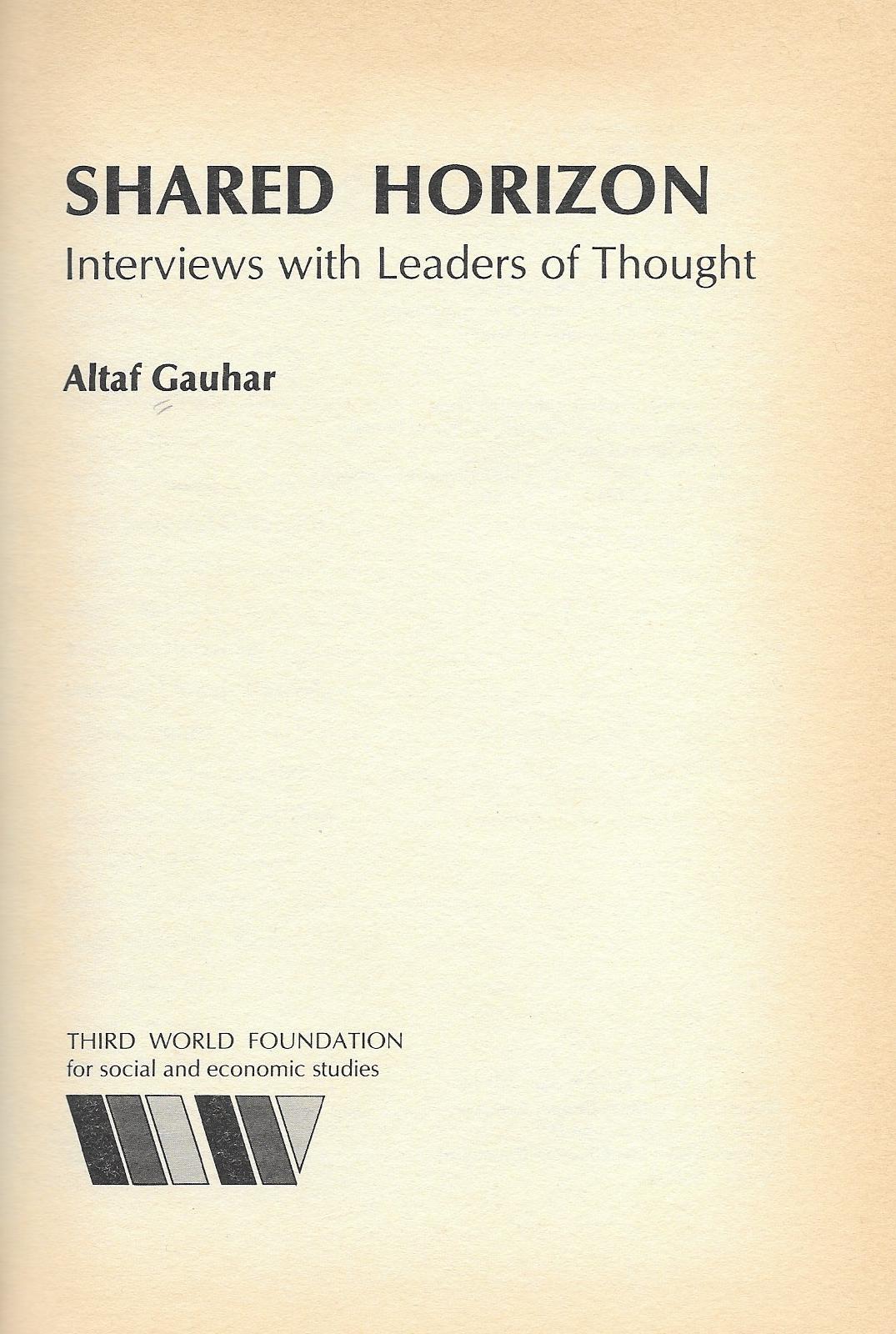 Shared Horizon - Interviews with Leaders of Thought, 1985: Seventeen internationally renowned political leaders, scholars and civil servants address the issues that lie behind the most pressing social, economic and political issues of the time. Among the various persons are Amadou-Mahtar M'Bow who was Director-General of UNESCO in 1974 and served for 13 years; Sean MacBride who rose from a domestic Irish political career and received the Nobel Peace Prize, the Lenin Peace Prize and the UNESCO Silver Medal for Service; David Owen who served as British Foreign Secretary; A.W. Clausen who served twice as president of Bank of America with a stint as head of the World Bank; John Kenneth Galbraith who was known for his support of public spending and his writings on economic topics; Huan Xiang who was a prominent expert in international affairs and a social scientist in China; Belisario Betancur who was the 26th President of Colombia; Cesar Virata who was the fourth Prime Minister of the Philippines; Julius Nyerere who was President of Tanzania; Sadruddin Aga Khan who served as UN High Commission for Refugees; Raul Ricardo Alfonsin who was President of Argentina; Bruno Kreisky who served as Foreign Minister of Australia and also as Chancellor.
Shared Horizon - Interviews with Leaders of Thought, 1985: Seventeen internationally renowned political leaders, scholars and civil servants address the issues that lie behind the most pressing social, economic and political issues of the time. Among the various persons are Amadou-Mahtar M'Bow who was Director-General of UNESCO in 1974 and served for 13 years; Sean MacBride who rose from a domestic Irish political career and received the Nobel Peace Prize, the Lenin Peace Prize and the UNESCO Silver Medal for Service; David Owen who served as British Foreign Secretary; A.W. Clausen who served twice as president of Bank of America with a stint as head of the World Bank; John Kenneth Galbraith who was known for his support of public spending and his writings on economic topics; Huan Xiang who was a prominent expert in international affairs and a social scientist in China; Belisario Betancur who was the 26th President of Colombia; Cesar Virata who was the fourth Prime Minister of the Philippines; Julius Nyerere who was President of Tanzania; Sadruddin Aga Khan who served as UN High Commission for Refugees; Raul Ricardo Alfonsin who was President of Argentina; Bruno Kreisky who served as Foreign Minister of Australia and also as Chancellor.
 Linking the South - The Road to Economic Cooperation 1986: This volume brings together papers presented a conference of South-South held in 1985 in Harare, Zimbabwe organisation by The Third World Foundation with the University of Zimbabwe and the Government of Zimbabwe as co-sponsors. A group of Third World experts and practitioners took a critical look at the achievements of South-South cooperation in the spheres of trade, industry, finance, information and human resources and suggest how it might be most fruitfully pursued into the future. The common theme that emerged was the importance of evolving flexible and practical programmes of economic cooperation in the special fileds under long-term arrangements and against a background of essential domestic and international structural changes.
Linking the South - The Road to Economic Cooperation 1986: This volume brings together papers presented a conference of South-South held in 1985 in Harare, Zimbabwe organisation by The Third World Foundation with the University of Zimbabwe and the Government of Zimbabwe as co-sponsors. A group of Third World experts and practitioners took a critical look at the achievements of South-South cooperation in the spheres of trade, industry, finance, information and human resources and suggest how it might be most fruitfully pursued into the future. The common theme that emerged was the importance of evolving flexible and practical programmes of economic cooperation in the special fileds under long-term arrangements and against a background of essential domestic and international structural changes.
Other Books Available from the Foundation
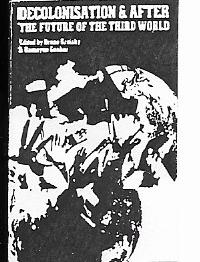 Decolonisation and After 1980: A thorough evaluation of all the decolonisation process and a perspective examination of the future of the Third World itself. Decolonisation unfolded in two phases. The first lasted from 1945 to 1955, mainly affecting countries in the Near and Middle East, and South-East Asia. The second phase started in 1955 and mainly concerned North Africa and sub-Saharan Africa.
Decolonisation and After 1980: A thorough evaluation of all the decolonisation process and a perspective examination of the future of the Third World itself. Decolonisation unfolded in two phases. The first lasted from 1945 to 1955, mainly affecting countries in the Near and Middle East, and South-East Asia. The second phase started in 1955 and mainly concerned North Africa and sub-Saharan Africa.
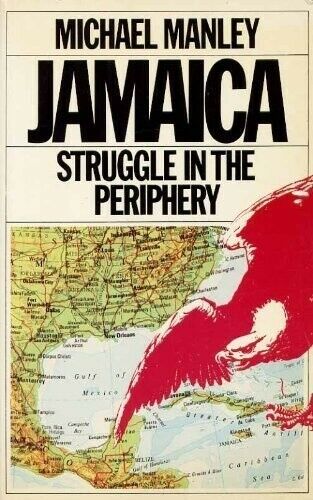 Jamaica - Struggle in the Periphery 1982: The personal reflections of Michael Manley’s tenure as Prime Minister of Jamaica reveal the bitter but yet unending dilemma of an independent Jamaica struggling to remain afloat politically and economically in the face of persistent obstacles coming from the United States; the struggle of a Third World country to overcome centuries of the impact of colonialism while wrestling to end domination and exploitation by foreign forces.
Jamaica - Struggle in the Periphery 1982: The personal reflections of Michael Manley’s tenure as Prime Minister of Jamaica reveal the bitter but yet unending dilemma of an independent Jamaica struggling to remain afloat politically and economically in the face of persistent obstacles coming from the United States; the struggle of a Third World country to overcome centuries of the impact of colonialism while wrestling to end domination and exploitation by foreign forces.
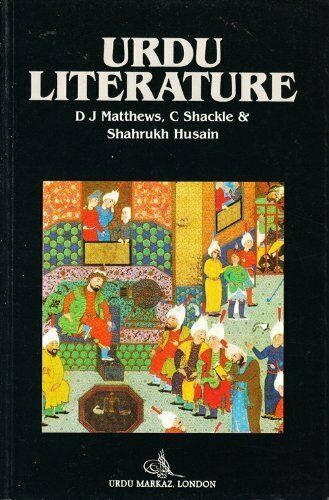 Urdu Literature 1985: Urdu literature continues to exert its special fascination for those who can enjoy its beauties in the original. Those unable to do so will now find a vivid description of the rich heritage of poetry first created in the declining years of the Mughal empire, which was adapted to meet the challenge posed by the British Raj, then transformed to express the people’s aspirations during the fight for independence and its aftermath.
Urdu Literature 1985: Urdu literature continues to exert its special fascination for those who can enjoy its beauties in the original. Those unable to do so will now find a vivid description of the rich heritage of poetry first created in the declining years of the Mughal empire, which was adapted to meet the challenge posed by the British Raj, then transformed to express the people’s aspirations during the fight for independence and its aftermath.
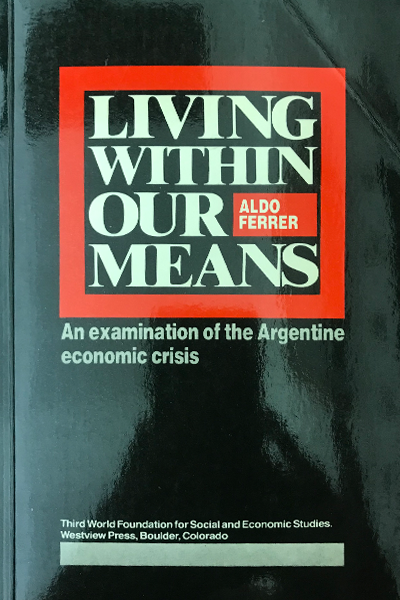 Living within Our Means 1985: A refreshingly lucid assessment of why Argentine found itself in economic crisis examining the fiscal chaos and the external debt question in Argentine economy. The main sources of the public and monetary imbalances and outlines of some basic measures for resolving the problems were identified with a proposal for financial reform to reduce the fiscal deficit.
Living within Our Means 1985: A refreshingly lucid assessment of why Argentine found itself in economic crisis examining the fiscal chaos and the external debt question in Argentine economy. The main sources of the public and monetary imbalances and outlines of some basic measures for resolving the problems were identified with a proposal for financial reform to reduce the fiscal deficit.
Third World Foundation Monographs
The Foundation also published a series of monographs dealing with questions of Third World interest. The series was intended to stimulate discussion and critical comment. Monographs were based on selected articles from the Third World Quarterly and on research papers, lectures and other original material. Selected monographs were translated into French, Spanish, Arabic, Chinese, Russian and other languages. Some of the titles published in this series include.
No. 1: The Politics of Affirmation by Michael Manley
No. 2: Not the Westminster Mode by Ralf Dahrendorf
No. 3: Global Energy Transition and the Third World by Dr Ali Ahmed Attiga
No. 4: The OPEC Special Fund and the North-South Dialogue by Ibrahim Shihata
No. 5: Free Flow of Information by Altaf Gauhar
No. 6: Constitutional Legitimacy: A Study of the Doctrine of Necessity by Leslie Wolf-Phillips
No. 7: Why 'Third World'? by Leslie Wolf-Phillips, Peter Worsley, S.D. Muni, Joseph L. Love and Grant McCall
No. 8: Western Democracy and the Third World by B.K. Nehru and W.H. Morris-Jones, Nkrumah
No. 9: Eighties by Shridath S. Ramphal
No. 10: no information
No. 11: no information
No. 12: Some in Light and Some in Darkness': the long shadow of slavery by Shridath S Ramphal
- Third World Foundation Monograph 12 (British Library London)
Third World Lecture
The Foundation held annual Third World Lectures were usually delivered by the winner of the annual Third World Prize at the presentation ceremony organised by the Third World Foundation.
The first annual Third World Lecture, THIRD WORLD UNDER CHALLENGE: THE POLITICS OF AFFIRMATION, was delivered on 29 October 1979, by the then Prime Minister of Jamaica, Hon. Mr Michael Manley at the launch of the Third World Foundation in London.
1981 Third World Lecture, Capitalism: The Second Crisis, was delivered on 2 April 1981 by Dr Raul Prebisch in New York at the presentation ceremony of the 1980 Third World Prize awarded to Dr Prebisch, a renowned economist of Argentina whose ideas gave shape to demands by developing countries for a New International Economic Order.
1982 Third World Lecture, South-South Option, was delivered in 1982 by President Julius Nyerere of Tanzania in New Delhi, at the presentation ceremony of the 1981 Third World Prize awarded to President Nyerere.
1983 Third World Lecture, Agricultural Progress: Key to Third World Prosperity, was delivered by Dr M S Swaminathan, Director General of IRRI, in Beijing, China at the presentation ceremony of the 1982 Third World Prize awarded to IRRI (the International Rice Research Institute, Philippines) for the work with the scientific community and especially those concerned with food security under the guidance of Dr S M Swaminathan.
1984 Third World Lecture, Ocean Space and Mankind, was delivered on 23 February 1984 by Professor Arvid Pardo, in Cartagena, Colombia at the presentation ceremony of the 1983 Third World Prize awarded to Dr. Pardo, "the Father of the Law of the Sea Conference", in recognition of his contribution to the birth of the modern law of the sea enshrined in the United Nations Convention on the Law of the Sea (UNCLOS).
1985 Third World Lecture, was delivered on 24 April 1985 by Willy Brandt, former Chancellor of the Federal Republic of Germany, at a symposium of the Third World Foundation in New York where he was presented with the 1984 Third World Prize for his contribution to world Peace and Third World development.
1986 Third World Lecture, Racism, apartheid and a new world order, was delivered on 5 May 1986 by Oliver Tambo in Kuala Lumpur, Malaysia at the presentation ceremony of the 1985 Third World Prize awarded to Nelson Mandela and Winne Mandela, the joint recipients, for their work in ending the apartheid regime in South Africa. While Nelson Mandela was imprisoned, the Prize was accepted on behalf of the Mandelas by Tambo, President of the African National Congress (ANC), South African political party and black nationalist organisation long dedicated to the elimination of apartheid.
1987 Third World Lecture was delivered on 23 January 1987 in London at the presentation ceremony of the 1986 Third World prize awarded to by Bob Geldof for his extraordinary effort in helping to relieve the famine in Africa. Not available.
1988 Third World Lecture was delivered on 2 May 1988 in Brasilia, Brazil at the presentation ceremony of the 1987 Third World Prize awarded to The International Planned Parenthood Federation (IPPF) and accepted by Mrs Avabai B Wadia, the founder of the IPPF and the Family Planning Association of India, working to promote sexual health and family planning. Not available.
1989 Third World Lecture was delivered at the presentation ceremony of the 1988 Third World Prize awarded to Gro Harlem Brundtland, Prime Minister of Norway, for her work as leader of the World Commission on Environment and Development. Not available.
1990 Third World Lecture was delivered at the presentation ceremony of the 1989 Third World Prize shared by Archbishop Desmond Tutu. Not available.
Third World Prize
At the launch of the Third World Foundation in London in 1979, The Hon Michael Manley, Prime Minister of Jamaica, also announced the institution of an annual Third World Prize of US$100,000 funded by Bank of Credit and Commerce International (BCC) that had constituted a Third World Prize Endowment Fund of US$ 10 million to be developed by 1 January 1990.
This award of $100,000 would go to the individual or group who had made the year's most outstanding contribution to Third World development, especially in the economic, social, political or scientific fields.
On 24 November 1980, at the London headquarters of the Third World Foundation for the Social and Economic Studies, the Chairman of the 1980 Prize Selection Committee, Shridath S Ramphal, announced that the first award of the Third World Prize was to be conferred to Dr Raul Prebisch, the renowned economist of Argentina: He said, "More than anyone else, Dr Prebisch has contributed to the theory of development by formulating specific measures and recommendations to resolve the economic and social problems of developing countries within a democratic framework". The guest of honour at the presentation was Dr Kurt Waldheim Secretary-General of the United Nations in New York, USA.
The Prize for 1981 was awarded to Mwalimu Julius K Nyerere and the presentation was made by Shrimati Indira Gandhi, Prime minister of India on 22 February 1982 in New Delhi.
The Prize for 1982 was awarded to The International Rice Research Institute, Manila and the presentation to the Director-General or the Institute, Dr. M. S. Swaminathan was made by Premier Zhao Ziyang of the People's Republic of China on 4 April 1983 in Beijing.
The Prize for 1983 was awarded to Professor Arvid Pardo who represented Malta in the United Nations, in recognition for his work in developing the concept on the Law of the Sea that promoted the idea that the resources of the oceans beyond national jurisdiction as "the common heritage of mankind". Third World nations also wanted to make it a part of their demands for a new economic order. The presentation was made by H. E. President Belisario Betancur of Colombia, on 23 February 1984 in Cartagena.
The Prize for 1984 was awarded to Mr Willy Brandt and the presentation was made by the Chairman or the Selection Committee Shridath S Ramphal on 25 April 1985 in New York in the presence of H. E. Mr Javier Perez de Cuellar Secretary-General of the United Nations.
The Prize for 1985 was awarded jointly to Nelson Rolihahlu Mandela, and Nomzamo Winne Mandela married to Nelson Mandela at the time, both South African ant-apartheid activists, for the message of freedom for all the world. The prize was accepted by Oliver Tambo of the African National Congress by Dr Mahatir Mohamad, Prime Minister of Malaysia, at the inaugural session of the Second Summit of the Third World Scholars and Statesmen, South-South II: Chartering the Way Forward, in Kuala Lumpur on 5 May 1986.
The Prize for 1986 was awarded to Bob Geldof , the renowned Irish singer and political activist, in recognition for "his personal mammoth crusade against human suffering and indifference, with which the world over identified." The prize was presented by Jose Sarney, President of Brazil.
The Prize for 1987 was awarded to the International Planned Parenthood Federation (IPPF) in recognition for the pioneering and courageous work carried out by the IPPF in helping governments to educate poor people about the concept of responsible parenthood with innovative activities that break the barriers against family planning.
The Prize for 1988 was awarded to Gro Brutland, first female prime minister of Norway, in recognition of the special leadership role that she had played in widening the outlook of the developed world. The prize was presented in London by Robert Mugabe, Prime Minister of Zimbabwe.
The Prize awarded in 1989 was shared by Archbishop Desmond Tutu, a prominent campaigner against apartheid in South Africa who was appointed by Nelson Mandela as President of South Africa, to head of the Truth and Reconciliation Commission to probe apartheid-era human rights abuses of the period and offered legal immunity to those who confessed to their crimes.
Research and Scholarships
The Foundation commissioned research and studies in various disciplines in collaboration with academic and research institutions. Among the projects undertaken were:
Regional Collective Self Reliance: The Foundation commissioned research and published the result of that research under the title Survey of Economy, Resources and Prospects of South Asia (Colombo: Marga Institute, 1981) The study was completed by the joint efforts of the research organisations of five countries of South Asia and 40 national link institutions in collaboration with the Marga Institute, Sri Lanka Centre for Development Studies, Colombo.
Contemporary China Study Centre: The Foundation assisted in establishing in 1980 a China Study Centre at Queen Elizabeth House, Oxford.
Centre for Comprehensive Security and Common Survival: The Third World Foundation undertook Preparatory work and discussed the principles of the Centre with many eminent leaders of world opinion. A concrete shape to the proposal was to have been given by end 1986.
Third World Scholarships: The Foundation established at the London School of Economics an undergraduate scholarship for up to three years, and a post graduate research award.
Conferences, Seminars and Exhibitions
South-South Dialogue: A seminar attended by Third World policymakers and negotiators, was held at Arusha, Tanzania in December, 1978. President Julius Nyerere addressed the seminar. Among others who attended were lsrnail-Sabri Abdalla (Egypt), Adebayo Adedeji (Nigeria), Dragslav Avrarnovic (Yugoslavia), Jagdish N Bhagwati (India), Carlos F Diaz-Alejandro (Cuba), Enrique Iglesias (Uruguay), Amir Jamal (Tanzania), Alistair McIntyre (Jamaica), Ashok Mitra (India), Raul Prebisch (Argentina), Shridath S Ramphal (Guyana), Justinian Rweyemamu (Tanzania), Soedjatmoko (Indonesia), Albert Tevoedjre (Benin), Timothy T Thahane (Lesotho), Cesar E Virata (Philippines), Joseph S Warioba (Tanzania), Bernard T G Chidzero (Zimbabwe). A statement issued by the seminar was considered by the Group of 77 at their Arusha meeting in February, 1979.
Nuclear Third World/Europe and the Third World: The Foundation convened two seminars in conjunction with the British lnternational Studies Association, one on Nuclear Non-Proliferation in September, 1979 in London UK, and the other on Europe and the Third World in December, 1980 in Lancaster UK.
Brandt Report: In addition to devoting an issue of the Third World Quarterly to the Brandt Report, a conference on the Report was co-sponsored by the Foundation, with Scottish Education and Action for Development, The Scotsman, and Scottish Television, in Edinburgh UK in November, 1980.
Third World Art Exhibition: The Foundation sponsored a Third World Art Exhibition in March 1981, in aid of the London School of Economics Fund.
Political Development in a Changing World Economy - The case of Latin America: The Foundation sponsored a seminar in conjunction with Millenium, Journal of International Relations, in London UK in April 1981.
Canada and the Third World: The Foundation held a conference in Toronto, Canada in June 1981, with academics drawn from 24 Canadian universities, to discuss interdisciplinary cooperation among Third World scholars in Canada.
South-South Conference 1983, Beijing, China: The Chinese Academy of Social Sciences (the premier academic organization and comprehensive research centre of the People’s Republic of China in the fields of philosophy and social sciences) and the Third World Foundation jointly convened the conference from 4-7 July 1983 which came to be called South-South I, to allow eminent Third World statesmen and scholars to meet in their individual capacities, for frank intellectual exchange on important issues relating to the social and economic development of the Third World.
The Conference was held at a time when the world as a whole, and the developing countries in particular, were suffering from the effects of global economics crisis. The principal elements in the crisis were a decline in world production, a sharp increase in the number of unemployed, a contraction in the world grade and disarray in the international financial system. Even more alarming was the fact that the major developing countries failed to agree on measures to deal with the crisis. The active involvement of the Chinese scholars in an intensive examination of the situation facing the South gave the deliberation of the Conference a distinctive complexion. There was unanimous agreement that increased cooperation had become a matter of urgency.

The Third Prize for 1982 awarded to Dr M S Swaminathan of the International Rice Research Institute was presented at the inaugural session which was addressed by the Premier of China, Zhao Ziyang; during his premiership thousands of industrial enterprises were given limited self-management, and peasants achieved increased control over and responsibility for their production and profits. His policies became the guiding principles for China’s future economic development.
- Beijing Statement 1983
- The Rich and the Poor
South-South Regional Conference 1984: The first regional conference of South-South was held in 1984 in Cartagena, Colombia under the Beijing programme and marked an important step towards South-South Two Summit scheduled for 1986. Sixty delegates from Latin America, Africa, Asia and the Caribbean and a dozen observers from Europe, US and Canada participated in the conference.
South-South Cooperation - Experience and Prospects conference 1985: The conference, the first to be held in Africa, was jointly sponsored by Third World Foundation and University of Zimbabwe brought together statesmen, scholars, experts, political scientists and others in their personal capacities, to share ideas and experiences in quest for a "new conceptual framework, renewed drive and inspiration." The Harare conference was in a series of historic regional conferences which began in Beijing in 1983 through Cartagena, Colombia in 1984.
The Conference's recommendations focused on improving South-South financial and trade cooperation through the creation of a Third World Bank; defining the role of universities in social transformation and as a research institutions; collaboration in the development and application of science and technology; the role of the South-based non-governmental organisations in fostering South-South cooperation; the creation of a South Commission consisting of eminent and influential personalities and experts from south to investigate further into the nature and processes of South-South cooperation. The Conference also focused attention on the evil of apartheid in South Africa.
- Inaugural Speech by Mr Robert G Mugabe, Prime Minister, Zimbabwe
- South - South Cooperation Banquet, Harare, Zimbabwe, 12 November 1985 - Toast Proposed by Mr Agha Abedi, Chairman, Board of Trustees, Third World Foundation in honour of His Excellency Comrade Robert Mugabe, Prime Minister of the Republic of Zimbabwe
South-South II Summit 1986: The second South-South Summit (South-South 11: charting the way forward) sponsored by the Third World Foundation and the Institute of Strategic and International Studies of Malaysia was held in Kuala Lumpur from 5th-8th May 1986 under the Chairmanship of Mahathir Mohamad, Prime Minister of Malaysia. The establishment of the South Commission was proposed to attend to several matters requiring urgent attention, including regional preferential trading schemes. payments and credit arrangements, the setting up of a Third World Bank, producer cooperation in central selling agencies, counter-trade, the harmonisation of banking laws, the flow of information, and research, training and consultancy.
South-South III Summit 1989: Information on the third South-South Summit is not available.
Other Conferences and Seminars
Back to the Barracks. The Foundation, in cooperation with the Institute of Commonwealth Studies, London, organised a seminar on the return to civilian rule in developing countries, at Windsor, England, in June 1984. The seminar papers were published in the January 1985 issue of Third World Quarterly.
The Third World: A Twenty-five Year Retrospective and Prospective. The Foundation and the Center for International Studies at Duke University, Durham, North Carolina, co-sponsored an international convocation at Duke University in February 1985, whose focal issues were development priorities, authoritarianism and military rule and international debt. The keynote address, delivered by Sir Shridath Ramphal, Secretary General of the Commonwealth Secretariat, is included in Third World Affairs 1986.
Survival in the Nuclear Age. To mark the Fortieth Anniversary of the commencement of the San Francisco Conference 1945, that led to the establishment of the United Nations, the Foundation and Parliamentarians for World Order co-sponsored a symposium in New York in April 1985. It was presided over by Mr Willy Brandt, former Chancellor of the Federal Republic of Germany. The Final Statement of the symposium, which subsequently formed part of the proceedings of the UN Conference on Disarmament, Geneva, is included in Third World Affairs 1986, together with papers delivered at the symposium.
The Transition to Democracy in the Third World. In cooperation with the University of Buenos Aires, the Foundation convened a conference in Buenos Aires in August 1985, to discuss the growing trend of re-democratisation in developing countries and the withdrawal of the military from political power. The inaugural address, delivered by Dr Raul Alfonsin, President of the Republic of Argentina, was published in the January 1986 issue of Third World Quarterly.
A Bank for Developing Countries - a Third World commercial bank
Among the proposals for South-South financial cooperation was the work of the Foundation on the concept a bank for developing countries - a South bank. In July 1983 Mr Agha Hasan Abedi, BCC President and Chairman of the Board of Trustees, Third World Foundation, proposed the setting up of a Third World commercial bank (Third World Bank) to address the shortage of foreign exchange to finance foreign trade and avoid dependence on the IMF/World Bank. The proposal had the backing of the developing countries however, it is reported that the imitative for the Third World Bank did not progress due to the pressure of the IMF on member countries who were already tied to the IMF with loans from the World Bank.
What happened to the Third World Foundation?
The Third World Foundation would appear to have ceased its activities following the closure of BCCI who contributed funds for the Foundation's work and initiatives.
- Interview with Rehman Sobhan 2019
Legacy
Third World Quarterly
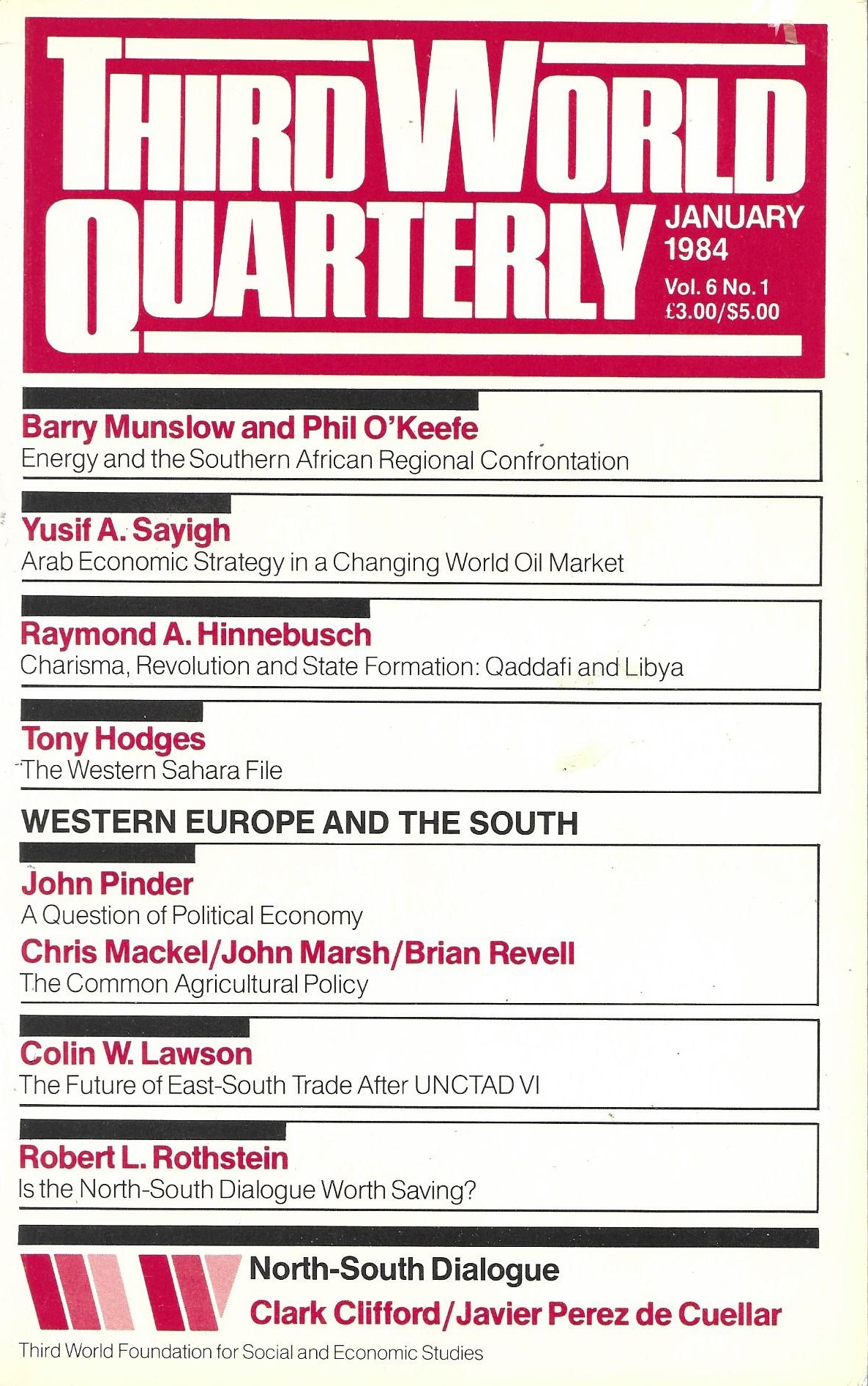 Third World Quarterly journal was published by the Third World Foundation since 1979.
Third World Quarterly journal was published by the Third World Foundation since 1979.
After BCCI's controversial closure in 1991, the journal continued as a publication of the Centre of Developing Areas of Research, University of London, Department of Geography, Royal Holloway, Egham, Surrey, United Kingdom.
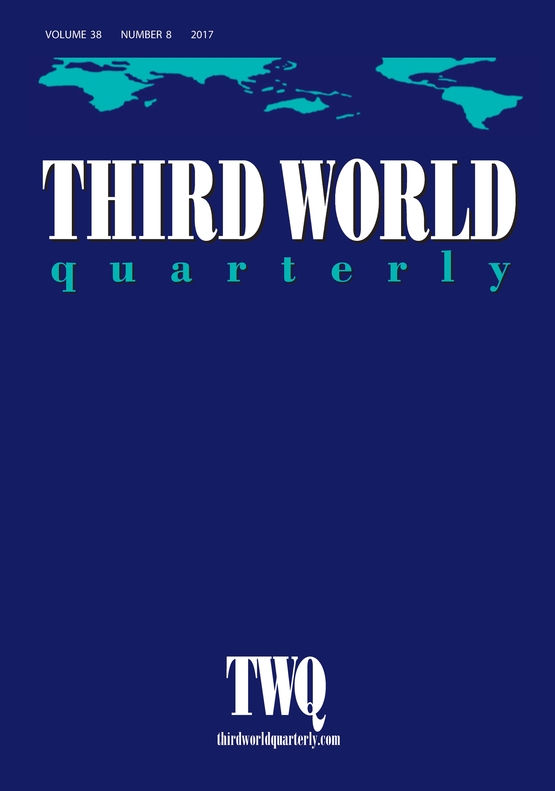
According to the Journal Citation Reports, the journal had an impact factor of 2.156 in 2018, ranking it 11th out of 41 journals in the category "Development Studies." Third World Quarterly which was previously complemented by an annual publication, Third World Affairs, is now complemented by its sister publication, Third World Thematics.
South Commission
The South Commission was formally established in 1987, following years of informal discussions among intellectuals and political leaders from the South representing developing countries. The final initiative was taken by Prime Minister Dr Mahathir Mohamad of Malaysia after a meeting organised in Kuala Lumpur by the Third World Foundation and the Malaysian Institute of Strategic and International Studie, an autonomous, not-for-profit research organisation with focus diverse research focus which includes economics, foreign policy, security studies, nation-building, social policy, technology, innovation and environmental studies.
Dr Mahathir Mohamad had announced earlier at the Non-Aligned Movement Summit Meeting in 1986 in Harare, Zimbabwe the intention to establish the South Commission under the Chairmanship of Julius Neyere, the first Prime Minister and President of Tanzania and Dr Manmohan Singh, an Indian economist and academic who was later Prime Minister of India, as Secretary General. The founder countries undertook to work together looking at the South, analysing the problems of its countries face, the strategies they have adopted in dealing with them, and the lessons which could be drawn from past experiences in the light of current and anticipated international conditions.
The South Commission carried out work in the final years of a decade that devastated many economies in the South and caused severe and widespread deprivation. Most developing nations were still grappling with the effects of high interest rates, low commodity prices, protectionism in rich countries, and perverse South-North transfers of capital. The Commission had a single purpose in mind. That purpose was to help the peoples and governments of the South to be more effective in overcoming their numerous problems, in achieving their ambition of developing their countries in freedom, and in improving the lives and living conditions of their peoples. The result of its work was published in 1990 in a publication titled The Challenge to the South: The Report of the South Commission.
Despite the very different backgrounds, experience, interest, faiths and ideologies of the members of the Commission, it was a unanimous Report, with recommendations on strategies appropriate for and conducive in development in the countries of the South in the 1990s and beyond. It was for each government and people to work out the tactics needed if its own country was to move in the directions suggested - and to determine its own timetable in so far as external circumstances allowed flexibility. Underlying all the Report's recommendations was the Commission's recognition, and clear statement, that responsibility for the development of the South lies in the South, and in the hands of the peoples of the South.
The Commission also recommended an expansion of South-South co-operation within an agreed framework with continuing political support and allocation of sufficient human and material resources for the work to be carried out through efficiently and expeditiously. Despite the intense financial crises facing most developing countries, the Commission collected over US$7.00 million for three years work (1987-1990). In addition to financial contributions by several developing countries, other contributions were provided by some institutions and other governments. In addition, The Third World Foundation contributed US$60,000.00, recorded under 'Financial and other Contributions' in The Report of the South Commission.
The Commissioners headed by Julius Neyere, included three eminent persons on the Third World Foundation Advisory Committee, Mr S. S. Ramphal, Secretary General, Commonwealth Secretariat, Enrique Iglesias, President Inter-American Development Bank and Professor of development economics and Dr Abdus Salam, Director, International Centre for Theoretical Physics, Trieste, Italy. On the Working Groups of the South Commission was Dr Dragoslav Avramovic, retired World Bank economist, a participant dealing with Debt issues, and also a participant in the Experts Groups dealing with South-South Co-operation, a plan of "Action for Promoting and Implementing Technical Cooperation among Developing Countries"; he was also advising the Bank of Credit and Commerce International (BCCI) on establishing the Third World Bank.
The South Centre
The South Commission was succeeded by The South Centre which was established by the South for the South in 1995 to continue the work of the South Commission in promoting the need for the developing countries to work together at the global level. The challenge was actively taken up by the Third World Foundation launched in 1979 with the support of BCCI.
A new multinational development bank
The work of the Third World Foundation included research on alternatives to various economic models of growth recommended, and in many cases imposed by the World Bank had proved inappropriate mainly because they confused growth with development, and there was little prospect of the developing countries breaking out of their state of dependency on the certain developed countries in the West dominated by USA.
The idea to create a Third World Bank advanced by Mr Abedi, BCC President and Chairman of the Board of Trustees of the Third World Foundation, was to provide bridging finance and extend short term commodity credit to all developing countries on commercial terms without requiring the countries to approach the IMF and World Bank.
The challenge for an alternative to the dominance of the IMF and World Bank was again taken up in 2012 by four of the richer Third World countries that were part of the BRICS group, Brazil, India, China and South Africa along with Russia with the objective of creating a multinational development bank (MDB) for financing infrastructure and sustainable development projects not just in BRICS but also in other emerging economies and developing countries.
The thought behind establishing such a MDB may be compared to the vision and the motivation behind the efforts to establish the Third World Bank. The African Development Bank established in1964, and the Asian Development Bank (ADB) established in1966, for example, were regional development banks and modelled closely to the World Bank and did not cater for short-term financing of trade as the Third World Bank was proposing to offer.
Acknowledgement:
Also read:
- Third World Prize
- Vision 2020
- Key Allegations
